- Home
- Aaron Allston
Five by Five Page 26
Five by Five Read online
Page 26
Greg nodded. “So we’ll instruct our Nomads to calculate the escape vectors once we launch and use them if we need them?”
Clark smiled. “Like you’re reading my mind.”
Something in that smile made Greg pause. The colonel had just ordered them to do something on the side which he wanted hidden from the Qian. But he knew the Qian would be able to monitor communications, could check the Nomads during or after the mission, and likely were even listening in on the briefing. Which means he wants the Qian to know how clever humans are, and yet underestimate us because we’re not smart enough to know that we can’t hide anything from them.
Wheels ground within wheels, and Greg’s head began to hurt. It’s like living at home with my father again. Greg shook his head to clear it. “Anything else, sir?”
“Just fly the way you know you can, and hope we don’t run into anything we can’t handle.”
–6–
Nick climbed into his Shrike and settled himself in the command seat. He slid the Nomad unit into the dock, then buckled himself into the safety harness while little lights played through the Nomad. By the time he was done, it glowed a soft green.
“Nomad set the Inertial Compensator Unit to .05.”
“Engineering and performance studies indicate a setting of .037 to be optimal for a Terran male of your height, weight and age.”
“When was the last time engineers flew a combat mission?”
“ICU set at .05.”
“Thank you.” Nick glanced at his flight console. The three main monitors were two square ones right and left, and a circular one dead center. For him the left displayed ship status, which monitored shield positioning and shape, structural integrity and the position of the landing skids. The right tracked weapons’-status and shield integrity. Pilots, at their whim, could swap data on the two screens. The centermost circular one provided a proximity scan of targets and other items of interest near the Shrike. Touching one of them would pull up a detailed scan of that item and place it on one of the auxiliary monitors.
On the right side of the console Nick had all of his flight gauges, included fuel, gravitation opposition, jump capability, speed, thruster status and balance. Until one of those screens began to flash red—a shade of red the Nomad had determined would draw his attention most quickly—he tended to ignore them. Combat was not a place to be flying by numbers; it was something you did with your gut.
Nick’s gut felt like he’d swallowed a Haxadis whole and raw, and had gone back for seconds. He’d never felt nervous heading out on combat missions. Little milk-run missions, on the other hand, had always been trouble. Nick figured part of his apprehension might stem from the mission’s purely political underpinnings. He didn’t like the idea some of his people might die just so one bureaucrat could shift a decimal point on a spreadsheet.
“Thus ever with idiots.” Nick forced himself to smile.
The three auxiliary monitors on the left side of his console lit up. One showed an image of the Unity. That screen would shift to anything he wanted to focus his sensors upon, but by default showed the Unity so a pilot could find his way home.
Below it, on the comms screen, each pilot’s name showed up as their ships came online. He tapped Major Taine and Captain Allen, highlighting them. The screen asked if he wished to group them, and a second group button appeared at the top of the screen, with the label “TacTwo.” Everyone in the squadron, the controllers aboard the Unity, and, eventually, the Haxadassi shuttle, would be added into TacOne.
I hope the Snakes aren’t going to use translation. If he issued an order, he wanted it obeyed, and fast. Delays caused by computer translation would get someone killed. And if they disobey and order, I’ll do the killing.
He touched the last auxiliary screen. It could be made to display any data the pilot needed, but for the moment Nick swiped a finger across it and brought up an ancient, black and white picture of a pilot standing beside a WWI Neuport biplane. Back when Nick had first flown in combat, he’d taped the battered original to his console, for luck.
He smiled. “As you were reported to say, ‘Always better to be lucky than good.’”
With his left hand, Nick spun a wheel and fed power to the Repeller/Attractor Coils. The Shrike lifted smoothly off the deck, its skids coming up a centimeter off the surface. He retracted them, then maneuvered the fighter around to face the aft launch bay. Nick nudged the throttle forward. The engines sent a thrum through the fighter, then the Shrike shot through the magnetic retention bubble and into space.
His heart pounded happily as he brought the Shrike around and up into an orbit above the Unity. Below Haxad Four slowly spun, displaying its white polar cap. He caught little flashes of green beneath thin white clouds at the outer edges of what he could see. He’d never been down there, but had been told that rainforest and desert abounded, with 35% of the surface covered by water. Haxad Four was an unforgiving world, and the Haxadissi were truly its children.
Despite not liking the mission, Nick could not help but smile. A year and a half’s worth of hard work had put the 301st together. While almost half the squadron waited for them at their initial base, and their first mission had been handed to them with insufficient training time, he didn’t doubt his people would do well. They might not have learned how to fly together yet, but they knew how to fly and that was what was the most important detail at the moment.
The other six fighters exited smoothly and formed up with him. As they came on station they reported in. Everyone was green across all instruments. “On me, Tigers. As per the mission brief.”
Moving the stick right, Nick took the Shrike through a barrel-roll, wing over wing, then pedaled in some rudder and headed straight for the rendezvous point. A red triangle appeared on his central sensor panel. He touched it and the image of the Haxadissi shuttle appeared on his target monitor. The ship’s comms link also appeared on his list, adding itself to TacOne.
On the approach, Nick shifted his shields so they covered his aft at double strength. Leading the shuttle back to the Unity he’d reverse the process, expand the field and angle the shields to provide the shuttle with some added protection. Angling and shifting shields always stressed the projectors, but being able to reinforce shields or cover a wounded ship was a valuable skill in combat.
A voice hissed over TacOne. “The shuttle Shan-chey identifies itself.”
“Shan-chey, this is Tiger Lead. Keep on this approach vector for escort to the Unity.”
“Shan-chey acknowledges.”
A light flashed below as the ovoid shuttle lifted free of the launch vehicle and began to accelerate. Two Shrikes—Taine and Allen—shot past to reach their position first, then the next two and the final pair. Nick eased back on the throttle to maintain his position.
Nick spared himself a moment to look out at the vastness of space. Poets and pundits had all offered their takes on it. Some saw the darkness as an ocean; others saw the stars as glittering jewels. He figured that each described it based on their fears, like being insignificant, or their vices, like greed. It gave him a window into them and their judgment.
What Nick enjoyed was the quiet. The Shrike’s engines sent a thrum through the craft, but he felt that more than heard it. Alarms would fill the cockpit with sound in combat, but in their absence, and if he kept his breathing quiet, it seemed as if all reality was sleeping peacefully. It was the quiet on a foggy lake, just before dawn, before the world woke up and demanded attention.
He drank it in, finding it an equal pleasure to the thirty year old Scotch. It was another of his vices, and one he indulged in very sparingly—more because of a lack of opportunity than any lack of desire.
As the shuttle reached the halfway point on its climb out of the planet’s gravity well, another icon appeared on Nick’s center monitor, offset slightly from the Unity. He tapped it fast, and his stomach knotted as the image appeared on his targeting display.
The ship appeared to be a wingless
dragonfly which had some hideous Qian designation, but he’d nicknamed Hive. Little more than a heavily modified cargo ship—which could haul as many segments as the engines could move—the Hive could pump out little fighters, waves of them, in the blink of an eye. Once they’d deployed their payload, they’d duck back into hyperspace and wait patiently for the battling to resolve itself.
Which, in this case, is going to be fairly quick.
The Hive dumped two flights of a dozen snub fighters he’d called Dulls. All of sixteen meters long, they looked as if their ovoid cockpits had been mounted on the aft end of a lawn-dart. They had half-decent shields, two engines, two lasers in the nose, and could carry a total of four Hadron Rockets—the junior version of the Baryon Missiles the Shrike’s carried. They had no hyperdrive, so that space had been given over to Multi-spectrum Sensor Counter-measures, and the MSSCM suites made the Dulls a tough target.
“Three, Nine, go to TacTwo. Everyone else, move to intercept the Dulls.” Nick dragged the Shan-chey onto TacTwo, then punched it up. “Shan-chey, return to base. You two get them there. Luck. Out.”
Nick hauled back on his stick, punched the throttle full forward, then came over in roll to point himself at the incoming Dulls. His combat HUD came up, surrounding him with a holographic display which added depth and data tags to everything within sensor range. If he reached out and touched any of the floating icons, he’d get a full infodump on them—but that really wasn’t going to help him. I just wish I could reach out and swat them.
Then the Dulls’ first wave lit off their rockets. Because his warning lock didn’t light up or alarms start howling, Nick knew they weren’t targeting him. All those projectiles were speeding straight for the Shan-chey, and barring a miracle, there wasn’t any way to stop many, let alone all, of them.
* * *
Greg’s combat HUD popped as he accelerated to get forward of the Shan-chey. “Three, you guide them down, I’ll buy time.”
Major Taine’s voice filled his earphones. “Roger, Nine. Shan-chey, break off and return to base.”
“Negative, Tiger Three. We are inbound the Unity.”
“Shan-chey, you will never get there. Break off now.”
More targets blossomed in Greg’s HUD. “Three, I have four-eight rockets inbound on Shan-chey. Time to target is sixty seconds.”
“Shan-chey, abort approach.”
“Negative, Tiger Three.”
Greg rolled his Shrike and brought it over the top of the lumbering shuttle. “Three, I have a plan. It’ll buy the shuttle some time. Be ready to repeat what I do. Shan-chey, all shields forward and full, full speed to the Unity, on my mark. Do it one second sooner and we all die.”
“Nine, what are you doing?”
“If I tell you, you’ll stop me.” Greg forced himself to laugh. “You get anything I miss.”
Greg knew he should be terrified or angry or something, but he couldn’t find a name for what he was feeling. He glanced through the holographic display at his auxiliary monitor. Jennifer and Bianca smiled at him. Though what he was doing likely would get him killed, he wasn’t doing it because he wanted to die.
It’s my duty. So you can be proud of me.
He brought his Shrike down to two-hundred meters off the Shan-chey’s bow. He tasked the Nomad with keeping him at that relative distance, then pumped all his shield energy forward. He warped the shields, forming a dish facing the incoming rockets. He switched his fire control over to the Baryon Missiles, then targeted an incoming Hadron Rocket. With one eye on the targeting monitor and another on the Shrike’s status monitor, he drew in a deep breath and slowly, serenely, exhaled.
Three hundred … two hundred … one hundred.
As far as the rockets processing units could determine, Greg’s Shrike was a mote against the Shan-chey’s bloated outline. As the first group of rockets entered the dish, Greg’s finger tightened on the trigger. Two Baryon Missiles jetted out, detonating amid that first swarm. The dish forced energy from the blast away from the Shrike, consuming more of the Hadron rockets. Greg launched another pair of Baryon Missiles, then keyed his radio. “Shan-chey, now!”
The shuttle lit off its engines and jetted forward. The Nomad throttled the Shrike up, pushing it before the Shan-chey like a plow. The Hadron Rockets altered course, many of them falling into the second fireball. Others shot past, unable to course-correct enough to pull out of Haxad Four’s gravity well. They exploded harmlessly.
The rest, however, did not. Sparks shot from Greg’s command console as his shield indicator went from green to yellow, then red and finally black—that last being the dead monitor’s color. The Shan-chey kept pushing him forward. He fired the third set of missiles. The combat HUD failed as they exploded in a supernova dead ahead of him.
Then a handful of Hadron Rockets streaked in past the fireball and exploded.
Greg’s world went black.
–7–
Nick Clark keyed TacOne. “Two and Six; Seven and Eleven, go after the Dulls that have not launched their rockets. Leave the first wave.” The little bars on the comms monitor flashed with acknowledgements. He had no expectations that the Shan-chey would survive the first wave of rockets, or that any of his pilots would survive the fight. To change that I have to kill more of them faster.
He half-laughed. Figuring he was as good as dead freed him of anxiety and fear. He’d have a few regrets, like not seeing Vych again, or Earth, but no guilt. His only failure would be in failing to harvest as many Dulls as humanly possible. And a couple more.
Just like the Nomad telling him what engineers and scientists deemed optimal, human pundits had long maintained that space combat would be largely automated and conducted at mind-boggling ranges. Missiles and rockets would have little value since heavy lasers could target and destroy them. That outcome required two things, however: the target having anti-missile defenses and the enemy lacking a sufficient quantity of missiles to overwhelm the defenses.
In this case, the Shan-chey’s anti-missile defenses didn’t exist and the Dulls had more than enough rockets. Reality knocked all sorts of combat theories into a cocked hat. This brought a smile to Nick’s face because it meant even space combat had a place in it for pilots. Moreover, he was willing to bet that while the Dulls grossly outnumbered his people, his pilots were the best in the system.
And I’m even better.
Nick hauled back on the stick and looped straight toward the Shan-chey. The first wave of rockets converged in a series of explosions. Some of the blasts illuminated the shuttle’s shields. They collapsed and a couple of rockets exploded near the hull. He couldn’t tell if there’d been a breach or not, but there wasn’t anything he could do about it if there was.
He rolled up on his port wing, pulled away at ninety-degrees to the shuttle’s flight path, then ruddered around so his nose pointed away from the Haxadis ship and the world below. His course took him up past the flight path of the Dulls heading in at the Shan-chey. He shifted his shields to cover his top and aft in case any chanced a shot at him, then came over, rolled out and swooped down.
The Dulls had grouped themselves into three flights of four. Nick went after the most forward quartet. He angled in from above and behind, waiting until he was at point-blank range. He left his targeting sensors off until the last second so there would be no warning. With the flick of a thumb he quadded his lasers, then pumped four searing bolts of coherent light into the Dull’s bulbous cockpit.
The ship exploded and Nick dove straight through the blast. He hauled back and left on the stick, rolling onto his left wing again, then kicked the right rudder and climbed. The formation he’d hit broke up, with one pilot diving after him, but the formation that had been on the port wing remained intent on the target. Nick came up fast, shifted his armament to the Meson Cannon, and hit the trigger.
Unlike the lasers, which pulsed out short bolts, the Meson Cannon projected a sizzling golden beam that, for a heartbeat, linked the two fighters. It
slashed through the port hull and killed that engine. The starboard engine maintained thrust, starting the Dull in a flat spin to the left. Then the tail snapped off and the two halves began a long, slow fall down toward Haxad Four’s snowy cap.
Targeting-lock alarms screamed in Nick’s cockpit. He hit rudder. The Repeller coils kicked in, skewing the ship’s tail around. He rolled, then leveled out for a heartbeat—just long enough for a Dull to drop onto his six. He shunted all power to the aft shields, chopped his throttle back to nothing, then nosed his Shrike down. Red laser bolts flashed against his shields, then the Dull overshot him. Nick pulled back on the stick and stabbed it with a golden spear, then thrust his throttle full forward and rolled to the right.
The Dull exploded and more angry red bolts burned through the space he’d just vacated. Nick laughed aloud. “Ambush isn’t turning out the way you thought it would, is it?” He throttled back again, rolling up onto a wing and turning a tight circle, then pointed his nose up and rolled out right. He shifted to quadded lasers. Two bolts hit, one in the engine, one through the cockpit. A fire flashed, blackening the canopy.
One flight down. Not that it really mattered because the other eight Dulls had gotten close enough to begin making attack runs on the Shan-chey. Another Shrike rose to engage them. Even as Nick brought his ship around to attack the Dulls, he realized that he’d lost either Greg Allen or Damienne Taine. Someone on the Unity would have noted who the first human martyr was in the 301st—a dubious honor which guaranteed immortality would enshrine failure.
A flurry of laser bolts rose from the Shan-chey’s scattered gunnery pods on. The Dull formations split to give the Haxadissi gunners a harder time. Nick’s targeting-lock alarms wailed as he got within range. They’re shooting at everything! Why they were even there instead of heading back to their homeworld he had no clue, but they were making damned hard to consider them allies.

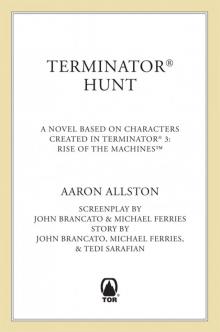 Terminator 3--Terminator Hunt
Terminator 3--Terminator Hunt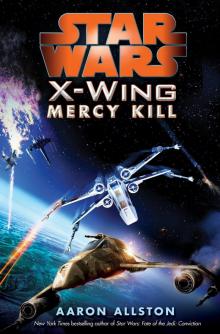 Mercy Kil
Mercy Kil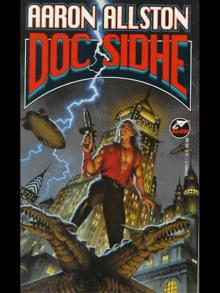 Doc Sidhe
Doc Sidhe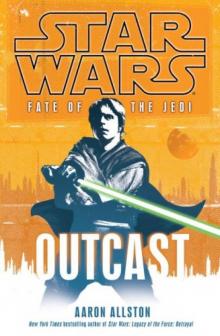 Star Wars: Fate of the Jedi: Outcast
Star Wars: Fate of the Jedi: Outcast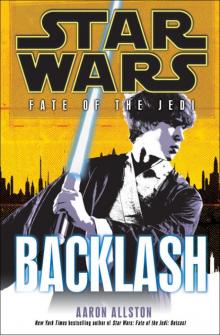 Fate of the Jedi: Backlash
Fate of the Jedi: Backlash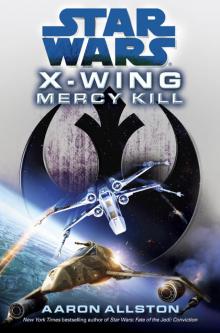 Mercy Kill
Mercy Kill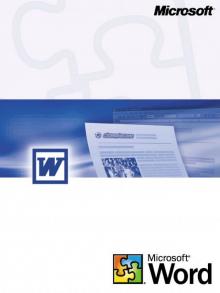 Rebel Stand
Rebel Stand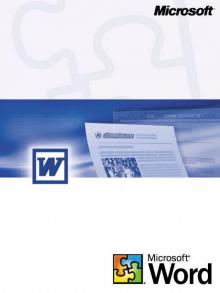 Wraith Squadron
Wraith Squadron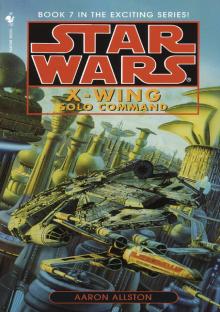 Star Wars: X-Wing VII: Solo Command
Star Wars: X-Wing VII: Solo Command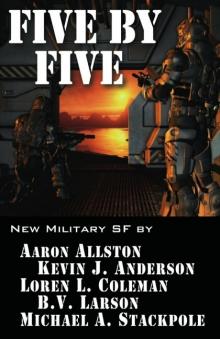 Five by Five
Five by Five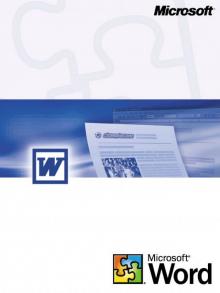 Solo Command
Solo Command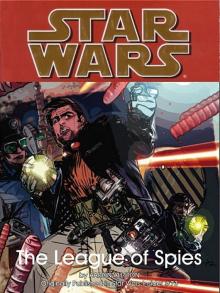 Star Wars: The Clone Wars Short Stories: The League of Spies
Star Wars: The Clone Wars Short Stories: The League of Spies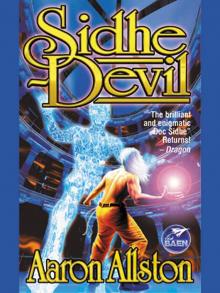 Sidhe-Devil
Sidhe-Devil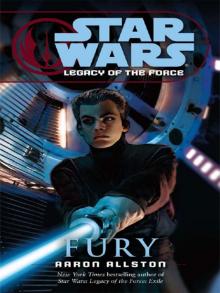 Star Wars: Legacy of the Force: Fury
Star Wars: Legacy of the Force: Fury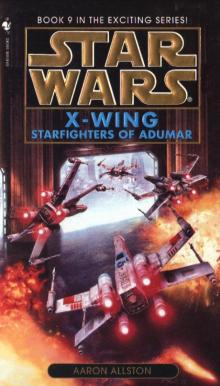 Starfighters of Adumar
Starfighters of Adumar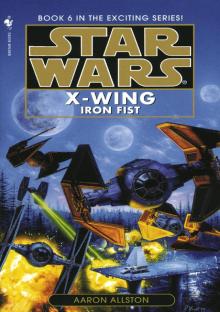 Star Wars: X-Wing VI: Iron Fist
Star Wars: X-Wing VI: Iron Fist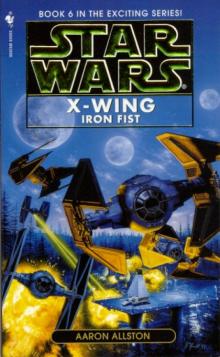 Star Wars - X-Wing - Iron Fist
Star Wars - X-Wing - Iron Fist Exile
Exile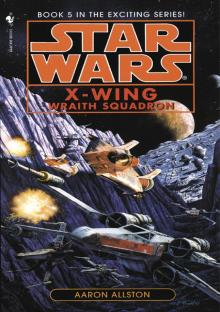 Star Wars: X-Wing V: Wraith Squadron
Star Wars: X-Wing V: Wraith Squadron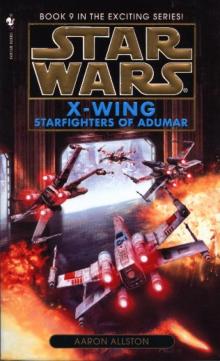 Star Wars - X-Wing - Starfighters of Adumar
Star Wars - X-Wing - Starfighters of Adumar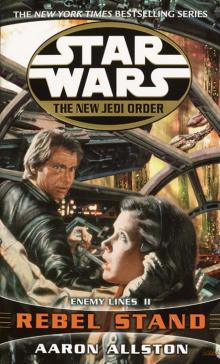 Rebel Stand: Enemy Lines II
Rebel Stand: Enemy Lines II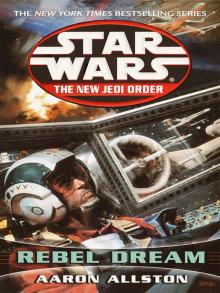 Rebel Dream: Enemy Lines I
Rebel Dream: Enemy Lines I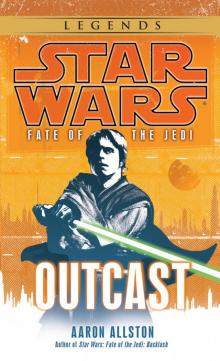 Outcast
Outcast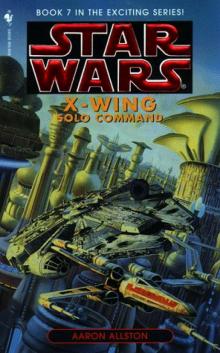 Star Wars - X-Wing 07 - Solo Command
Star Wars - X-Wing 07 - Solo Command